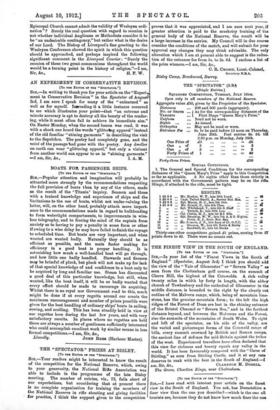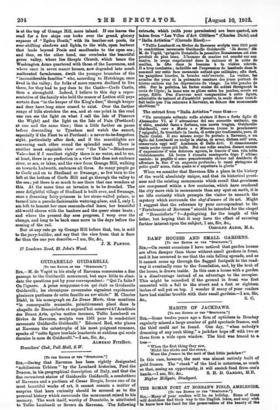[To THE EDITOR OF THE "SPECTATOR."]
Srn,—I have read with interest your article on the finest view in the South of England. You ask, has Dorsetebire a finer view than the one you describe P—which is the one all tourists see, because they do not know how much finer the one
is at the top of Grange Hill, more inland. If one leaves the road for a few steps one looks over the grand, gloomy expanse of "Egdon Heath," with its heather-set pools, its ever-shifting shadows and lights, to the wide, open harbour that leads beyond Poole and sandbanks to the open sea ; and then, on the other hand, one overlooks the beautiful green valley, where lies Steeple Church, which bears the Washington Arms quartered with those of the Laurences, and where once in seven manor houses, now degraded into much maltreated farmhouses, dwelt the younger branches of the
" inconsiderable families " who, according to Hutchings, once lived in the valley; for folks of more renown declined to live there, for they had to pay dues to the Castle—Corfe Castle, then a stronghold. Indeed, I believe to this day a repre- sentative of the family who held the manor of Lutton still pays certain dues " to the keeper of the King's deer," though keeper and deer have long since ceased to exist. Over the farther range of hills stretches the sea, and at one point in the road one can see the light on what I call the Isle of Pleasure the Wight) and the light on the Isle of Pain (Portland) at one and the same time; then a little farther on pause before descending to Tyneham and watch the sunset, especially if the Fleet be at Portland : a never-to-be-forgotten eight, particularly after dark, and if the searchlights are answering each other round the splendid coast. There is another most exquisite view over "the Vale"—Blackmoor Vale—but if I recollect rightly there is no water, and to me, at least, there is no perfection in a view that does not embrace river, or sea, or lakes, and the view from Grange Hill, walking on towards Lulworth, embraces all three. So many people go to Corfe and on to Studland or Swanage ; so few turn to the left at the bottom of Corfe Hill and go through the valley to the sea ; yet there is so much to see there that one wonders at this. At the same time an invasion is to be dreaded. The once delightful village of Studland is built over, and Swanage, once a dreaming fairy-princess in her stone-walled palace, is turned into a pseudo-fashionable watering-place, and I, only I, am left to lament her once osmunda-clad lanes, her beautiful
old-world shores with the bankers and the queer stone boats ; and where the present day sees progress, I weep over the change, and long to be back once more in the days before the coming of the rail.
But at any rate go up Grange Hill before that, too, is sold to the jerry-builder, and say that the view from that is finer far than the one you describe.—I am, Sir, &c.,
17 Loudoun Road, St. John's Wood.
J. E. PARTON.



































 Previous page
Previous page